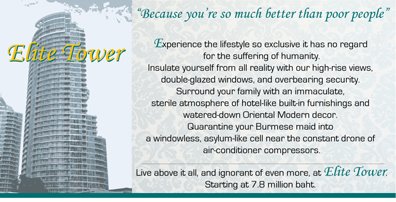THONGLOR – Bangkok is a terribly expensive city, according to Madeleine Grady, an American expatriate who pays too much for everything she buys.
“I’m still in shock at the prices here. Our rent is over four thousand (dollars) a month!” she said, referring to the 4-bedroom high rise she shares with her husband and two young children on Thonglor Soi 12, which she found through a real-estate broker who specializes in executive expat home-finding. “We paid far less in Atlanta, and had a nicer garden.”
Furnishing the 320-square meter apartment has also proven to be expensive, largely due to Grady’s tendency to shop at either the European bespoke design shops in her neighborhood, or browse for “Thai-style” accessories at Paragon Passage Exotique, which sources cheap domestic textiles and marks them up 600% for unknowing foreign buyers.

Grady, who buys her groceries at Villa in J-Avenue mall, was also amazed at the price that she thinks Thai people pay for fruits and vegetables. “A hundred baht for celery, and five hundred for cherries,” she recalled, failing to note that her selected items were not native to Thailand and were imported by air from Australia to satisfy the needs of Western and Japanese customers. “They told me fruit was cheap in the tropics but it sure isn’t from where I’m standing.”
As as full-time mother, Grady spends much of her time “bargain hunting” – the term she uses to refer to the act of comparing one overpriced expat service or product to another – and feels that after three months she’s a veteran of Thailand expatriate life, where there are simply no bargains to be found.
Among her biggest complaints was the price the family had to pay for their seven-seater Toyota Wish. “I can’t believe a car costs $35,000,” she said. “It’s absurd that Thais pay so much for a common Toyota,” she continued, unaware that 80% of Thais cannot afford cars and that a Wish is not common.
Grady also specifically failed to observe that parking, insurance, and maintenance on her Toyota costs 70%, 65%, and 40% lower, respectively, than they did in the US, focusing instead on the fact that a Toyota “costs only $18,000 in America.”
Other complaints included having to pay $80 for an “average Italian meal” at Beccofina, which does not aim for an average Thai consumer, paying $600 for an iPhone 4 which costs “only $400 in America,” but binds the buyer to a two-year contract with T-Mobile telecom, and $120 for a Calphalon saucepan at Paragon, which was imported from Ohio.
According to Grady, however, the biggest rip-off was enrolling her two children, Ben and Amia, in private kindergarten in the Thonglor area. After comparing four area schools and concluding that Little House on Thonglor Soi 9 was the “best deal,” Grady now pays ฿300,000 per year for pre-school.
“It simply isn’t fair that we don’t have better choices,” she said, apparently unaware of no fewer than six less expensive private kindergartens in a five-kilometer radius, as well as a dozen private Thai schools that cost less than a third of Little House, and regular Thai schools that cost ฿900 per year.
Overall, however, Grady insists that she loves Thailand and that she is willing to make every effort to integrate into her new home.
“Thai people are so friendly,” she said. “I just pity them because they live in such an expensive country. If only I could show them what life could be like with good public schools and cheap food.
“I guess you never appreciate the things that are right under your nose.”


